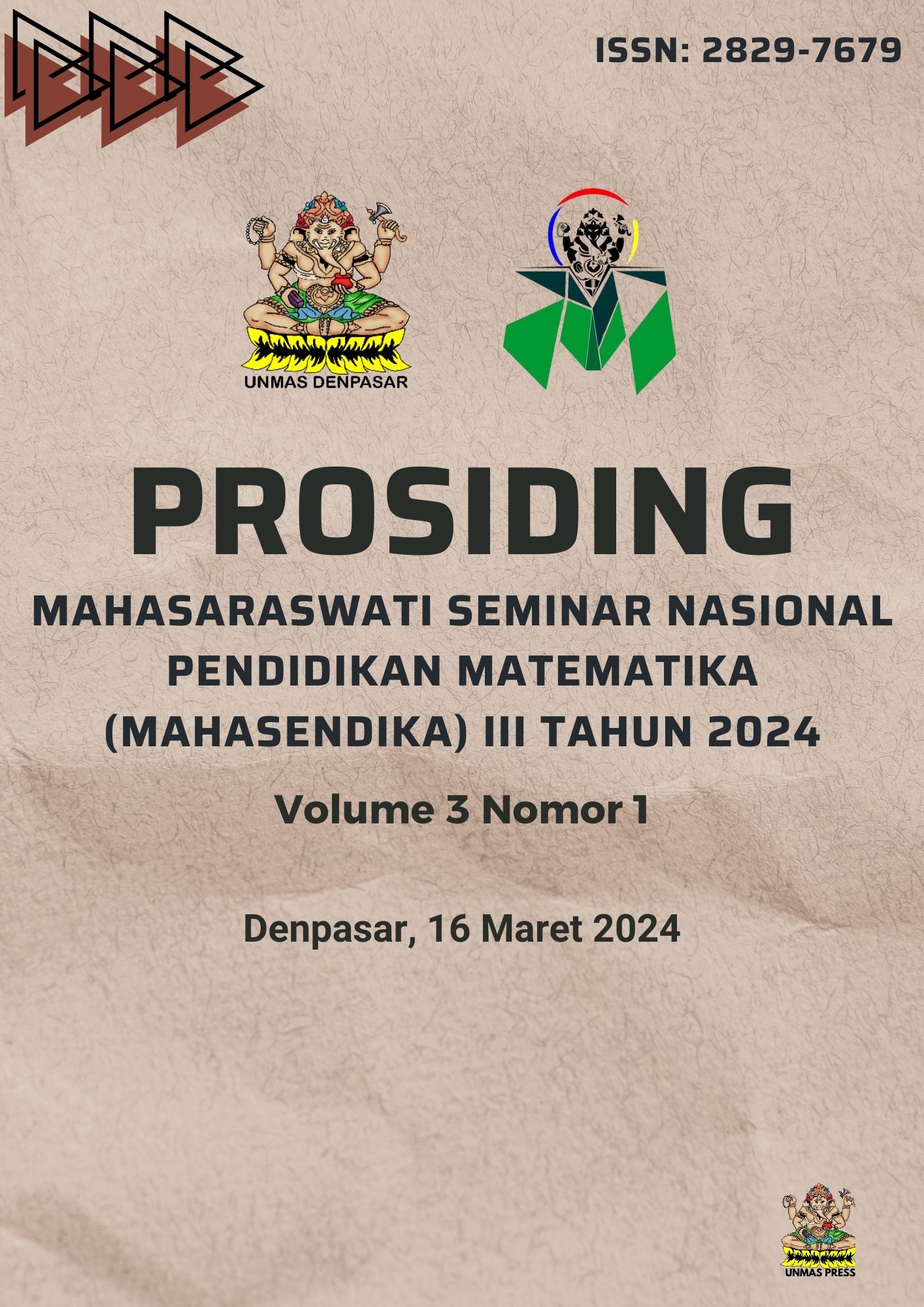PENGEMBANGAN LEMBAR KERJA PESERTA DIDIK (LKPD) MATEMATIKA BERBASIS BUDAYA KARO UNTUK MENINGKATKAN KEMAMPUAN KOMUNIKASI MATEMATIS
Keywords:
Budaya Karo, Kemampuan Komunikasi Matematis, LKPDAbstract
Penelitian pengembangan ini menghasilkan produk berupa Lembar Kerja Peserta Didik (LKPD) pada matapelajaran Matematika dengan materi Sistem Persamaan Linier Tiga Variabel (SPLTV) yang berbasis Budaya Karo. Pengembangan produk ini dilakukan dengan tujuan untuk merancang produk LKPD Matematika yang dapat meningkatkan kemampuan komunikasi matematis siswa SMA melalui pendekatan Budaya Karo. Jenis penelitian yang digunakan adalah penelitian dan pengembangan (R&D) dengan desain penelitian model 4-D. Produk ini sudah diujicobakan kepada siswa/i kelas X di SMA N 1 Kabanjahe dan SMA N 1 Berastagi. Produk ini sudah divalidasi oleh 5 orang ahli. Instrument yang digunakan untuk pengembangkan produk ini adalah lembar validasi LKPD berbasis Budaya Karo terintegrasi Model PAKIM. Berdasarkan ujicoba diperoleh hasil analisis kevalidan dengan kriteria “valid”.
References
Barwell, R., Boylan, M., & Coles, A. (2022). Mathematics education and the living world: A dialogic response to a global crisis. The Journal of Mathematical Behavior, 68. https://www.sciencedirect.com/science/article/abs/pii/S0732312322000815Barwell, R., Boylan, M., & Coles, A. (2022). Mathematics education and the living world: A dialogic response to a global crisis. The Journal of Mathematical Behavior, 68. https://www.sciencedirect.com/science/article/abs/pii/S0732312322000815
Bashooir, K., & Supahar. (2018). Validitas dan Reliabilitas Instrumen Asesmen Kinerja Literasi Sains Pelajaran Fisika Berbasis STEM. Jurnal Penelitian Dan Evaluasi Pendidikan, 22(2), 168–181. https://doi.org/10.21831/pep.v22i2.20270
Budiastuti, D., & Bandur, A. (2018). Validitas dan Reliabilitas Penelitian. In Binus. www.mitrawacanamedia.com
Cimen, O. A. (2014). Discussing Ethnomathematics: Is Mathematics Culturally Dependent? Procedia - Social and Behavioral Sciences, 152, 523–528. https://doi.org/10.1016/j.sbspro.2014.09.215
D’Ambrosio, U. (1985). Ethnomathematics and Its Place in the History and Pedagogy of Mathematics. For the Learning of Mathematics, 5(February 1985), 44-48 (in 'Classics').
Favilli, F. (2004). ETHNOMATHEMATICS AND MATHEMATICS EDUCATION. Proceedings of the 10th International Congress of Mathematics Education Copenhagen.
Muhtadi, D., Sukirwan, Warsito, & Prahmana, R. C. I. (2017). Sundanese ethnomathematics: Mathematical activities in estimating, measuring, and making patterns. Journal on Mathematics Education, 8(2), 185–198. https://doi.org/10.22342/jme.8.2.4055.185-198
Retnawati, H. (2016). Analisis Kuantitatif Instrumen Penelitian.
Revita, R., Kurniati, A., & Andriani, L. (2018). Analisis Instrumen Tes Akhir Kemampuan Komunikasi Matematika Untuk Siswa SMP Pada Materi Fungsi Dan Relasi. Jurnal Cendekia : Jurnal Pendidikan Matematika, 2(2), 8–19. https://doi.org/10.31004/cendekia.v2i2.44
Shalihah, N. M. (2021). Pengembangan Tes Prestasi Belajar Pada Mata Pelajaran Ppkn Development of Achievement Test in Civic Education Elementary School. 67–79.
Staddon, R. V. (2022). A supported flipped learning model for mathematics gives safety nets for online and blended learning. Computers and Education Open, 3, 100106. https://doi.org/10.1016/j.caeo.2022.100106
Thanheiser, E. (2023). What is the Mathematics in Mathematics Education? Journal of Mathematical Behavior, 70(January), 101033. https://doi.org/10.1016/j.jmathb.2023.101033
Thanheiser, E., & Melhuish, K. (2023). Teaching routines and student-centered mathematics instruction: The essential role of conferring to understand student thinking and reasoning. Journal of Mathematical Behavior, 70(January), 101032. https://doi.org/10.1016/j.jmathb.2023.101032
Wilson, J., & Hunt, J. H. (2022). Marginalized within the margins: Supporting mathematics meaning making among students with learning disabilities. Journal of Mathematical Behavior, 67(May), 100982. https://doi.org/10.1016/j.jmathb.2022.100982

